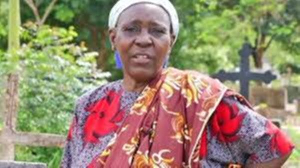Do you recall sitting in a classroom and not understanding what the teacher was teaching, but feeling shy or timid to ask a question or make a request of the teacher? Asking a question or making a request in class may reveal some level of ignorance of the subject matter and so it takes courage to overcome the perception that you did not know what you should have known.
Interestingly, there may have been others in the classroom who were even more confused or less knowledgeable about the subject matter than you were, but kept quiet because they, too, were afraid or shy to speak up. It does not end in the classroom. In the corporate world, many people keep quiet in meetings even though they do not understand what is being discussed. Many do not wish to ask a question or make a comment that may lead the boss or colleagues to think they are ignorant about something they should have known. It happens at Church events and social gatherings as well.
That was probably the situation in which the disciples of our Lord Jesus Christ found themselves on the subject of prayer. Jesus had carefully selected twelve of his followers as his disciples. They were men from different social economic backgrounds who loved the Lord and provided him with support and companionship. They had seen Jesus perform several miracles and pray to his Father in heaven. Apparently, despite their closeness to Jesus, they did not know how to pray or how to pray well - and perhaps lacked the courage to ask Jesus to teach them how to pray.
All that changed one day. On that day, after they had watched Jesus pray, one of the disciples gathered courage and said to Jesus, “Lord, teach us to pray, just as John taught his disciples.” (Luke 11:1). The fact that the disciple asked on behalf of all of them suggests that he was not the only one who did not know how to pray and they might have discussed among themselves previously, but lacked the courage to ask Jesus. Jesus gladly taught them what has become the most recited and powerful prayer – The Lord’s Prayer.
We know about the Lord’s Prayer today because one disciple gathered courage and decided to learn something important that he did not know before. He did not seem to worry about what the others thought about his display of ignorance. To him, the benefit of learning how to pray outweighed all other considerations. Jesus granted his request and all of us are beneficiaries. This shows that prayer, like almost all activities in this world, can be taught or learned. The Lord’s Prayer itself will be discussed in Part 3 of this three-part series of articles.
Learn, learn, and learn widely and wisely. Learning is a life-long experience. Learning stimulates the mind and fosters growth - growth in the mind, body and soul. If we stop learning, we will not progress. It is never too late to learn something new and important, such as prayer.
Like the disciples before that day, some of us have allowed excuses – some genuine, others flimsy - to prevent us from taking advantage of learning opportunities by asking the right questions or making requests that would point us in the right direction to go to school, take a course or class, learn a trade, start a business, or seek employment etc. Let’s follow the example of the disciple who made the request and act accordingly.
Modernly, various devices have made learning easier than before; not easy, just easier. With the aid of computers, Internet, social media, iPhones and other information, communication and technology (ICT) devices, one is no longer required to sit in a classroom or a particular place in order to learn and acquire certain knowledge or skills. We can learn in the comfort of our own homes. And so we should ask questions and make demands until we find the right answers.
However, in the pursuit of knowledge, we should not forget to seek the Lord while He may be found (Isaiah 55:6). God is the fountain of all knowledge. As King Solomon, a teacher and the wisest person who ever lived, put it simply: the end of the matter we have heard is that we should fear the Lord and keep His commandment for this is the whole duty of man (Ecclesiastes 12:13).
Teaching and learning are two sides of the same coin. If you think learning is hard, try teaching. A teacher must not only know the subject matter, but must understand it well enough to impart same to others. Just as we need good teachers to impart knowledge and skills, we need good learners to learn what is taught. Good teachers make learning easier and inspire confidence in learners to learn more, and good learners encourage teachers to give their best. However, there are teachers whose intimidating demeanor in classroom frightens learners to the point where they cannot ask questions. You may remember teachers like that in your school days.
What teachers do may not always be appreciated, but it is quite amazing. From little children who are taught A, B, C, and 1, 2, 3 in kindergarten, to adults grasping with complicated concepts at the university level; and to all others who are exposed to teachings about God, Jesus, prayer, salvation, heaven and hell, teachers do an excellent job of teaching and creating a learning environment conducive to learning in most efficient ways. At each level of the education, training or apprenticeship process, a single teacher is able to impart knowledge and skills to several learners at the same time. The efficiency has been further enhanced with the aid of ICT devices that enable teaching and learning to be carried out instantaneously worldwide.
Teachers come in various forms, such as parents, pastors, preachers, advisors, mentors, counselors, coaches, and trainers. The Bible warns that there will be false prophets and false teachers among us who may teach destructive heresies and deny the sovereign Lord (2 Peter 2:1). That is why people should not follow teachers blindly without asking any questions. Such blind following, devoid of Biblical knowledge, has led many astray. The Bible also advises Christians to test the spirits to see whether they are from God (1 John 4:1). The best way to discover the truth is to ask the right questions, study the Bible, and pray to God for divine guidance.
Many people know others who know something useful that they do not know, but they do not ask them to teach them. In the field of ICT, for example, there is role reversal. Generally, children or the younger generation know more than their parents. If your children know more about ICT than you do, do not worry about the role reversal; ask them to teach you. You most likely paid for their knowledge through your payment of school fees or the ICT devices anyway.
The disciples’ lack of knowledge about how to pray at that time seems understandable. Jesus was right there with them to supply all their needs. They were comfortable - like kids who have rich parents. However, by learning how to pray, the disciples were unknowingly preparing themselves for the day when Jesus would not be physically present with them. In the same way, we need to challenge ourselves and break new grounds outside our comfort zones because our sources of comfort and security today may not be available tomorrow.
We may never know the name of the courageous disciple whose request prompted Jesus to teach us the Lord’s Prayer. However, we need more people like him. We will progress as Christians and as human beings generally if we have good teachers who are knowledgeable and eager to teach, and curious and good learners who are eager to ask questions and learn.
Opinions of Wednesday, 19 December 2018
Columnist: Daniel Gyebi



















